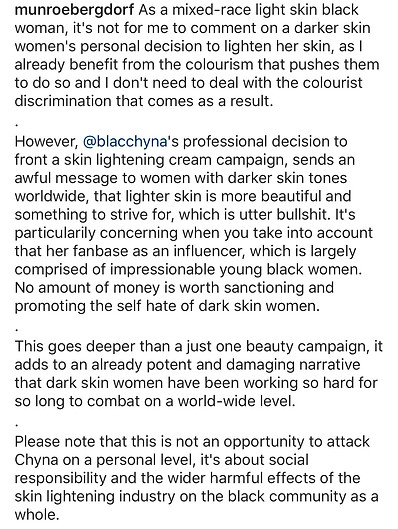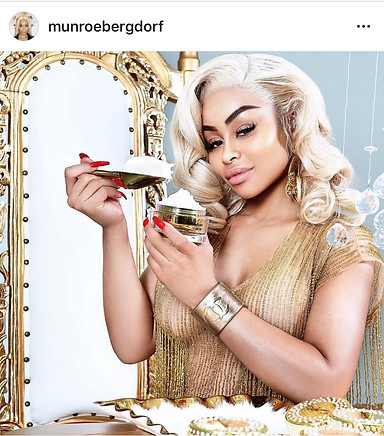
Skin Bleaching
Skin bleaching and lightening is a multibillion dollar industry dominating the West African cosmetics market, reports Helene Cooper in a 2016 New York Times article. This sends a message to everyone about the value of light skin in our society. Skin bleaching impacts black women in America as well. In October of 2018 Peyton Blakemore published an article on iHeartRadio about The' Love & Hip Hop: Atlanta' star Spice bleaching her skin. She was quoted stating "Basically as a black woman, I'm mostly called black by my own race. And I'm trying to please them so I'm gonna see what they have to say now. Because of them, I've changed my complexion a bit. I'm just pleasing them. They asked for it so I'm just giving it to them. That's basically what it's about — I think the ['Black Hypocrisy'] will explain more to you. Why I decided to go this route." Black Hipocrisy was her newest music video released at the time of her skin bleaching. In this music video she raps about colorism within her own community and how she was made to feel inferior because of her skin color. I want to make it clear that pointing out these women that have bleached their skin is not at all to demonize or target them in any way. Looking at examples of black women in the hip hop and beauty culture industry can help us see the overall societal impact colorism has on these women. Individuals are not the ultimate culprit, especially individuals who have been targeted and personally impacted by the system of colorism.
Oberiri Apuke published research in 2018 analyzing why women bleach their skin and the influence media has on skin bleaching. He highlights the association between light skin, higher status, privilege and beauty and the image music videos in particular project of white skin. The entertainment industry glamorizes lighter skin black women who have undergone skin bleaching without revealing the hidden dangers of skin bleaching. Blogs such as Colorism Healing and Dark is Beautiful go into greater detail about the harmful effects of skin bleaching, and colorism in general. In one particular post on Colorism Healing by Sarah Webb, she captures an excellent quote that I cannot possibly reword. She includes a quote by Evelyn Glenn (2008) when she states how skin lightening is"interwoven into the world economic system and its transnational circuits of products, capital, culture, and people” and how "media and messages, cultural themes and symbols, used to create the desire for skin lightening products" (p.282). The media messages and cultural themes and symbols are what we need to focus on, not individuals. The influence of westernized capitalism and culture are powerful in asserting beauty standards such as light skin. This is a global issue impacting women across the world. To read more about the specifics of the roots of skin bleaching please refer to this article on the blog Colorism Healing. It is important to analyze how this societal value placed on light skin is an accumulation of years of conditioning, white power, and westernized culture. To make change we need to dissemble all aspects of the system that implemented this epidemic in the first place. Breaking down eurocentric beauty standards needs to take place on big platforms, and to get there we first need to spread awareness of this problem and reach more people to involve in this movement towards love for all skin and all beauty.
On Monroe Bergdorf's Instagram, she beautifully sums up the points I've been trying to emphasize while talking about the recent news of rapper Blac Chyna's skin lightening product. https://www.instagram.com/munroebergdorf/
Media Representation of Black Women
According to Lisa Hebert and Dwight Brooks' research on gender, race and media representations, the dominating white producers controlling Hollywood are free to construct the image of black women in a way that appeals them and their goal of reaching a larger audience. This includes the sexualized black woman in hip hop culture. But this sexualized image is commodified so it is a very specific type of black woman to be used as the sex symbol. Hebert and Brooks state "the beauty ideal for black women in music videos is just as impossible as the white female beauty ideal," which I think is a profound statement that is under researched. The black body they look for in hip hop has large breasts, a thin waist, a large butt, with the added Westernized beauty standards of light skin, light colored eyes, and long hair. Scholar Bell Hooks is quoted in their research stating "light skin and long, straight hair continue to be traits that define a female as beautiful and desirable in the racist white imagination and in the colonized black mindset…Stereotypically portrayed as embodying a passionate, sensual eroticism, as well as a subordinate feminine nature, the biracial woman has been and remains the standard other black females are measured against.” Bell Hooks makes an extraordinary point here by capitalizing on the racist white imagination. I argue the racist white imagination only has tolerance for a certain kind of black. That black needs to be entertaining, and fit within their idea of "attractive blackness." This attractive blackness is palatable to whites because it serves them in some way. For example, light skin black women with barely any clothes on serves white viewers in hip hop videos because this image has been highly sexualized. I wonder how a dark skin black women, flaunting her natural hair, fully clothed would be interpreted by the racist white imagination? Does she have a place in eurocentric beauty standards projected in hip hop culture and white supremacist beauty culture? And even when the black woman does have a place in these spheres, what does she stand for? Who is she serving? Is she seen as fully human? The identity of black females depicted in media needs to be multi-faceted and value them for their talents rather than their looks. A comprehensive study titled Race, Body and Sexuality in Music Videos by Erika VanDyke breaks down this issue and the impact this kind of representation of black women has on viewers.
The two most popular female rappers at the time are Cardi B and Nicki Minaj. They both happen to be light skin black women with big breasts and butts due to surgery. It is not a coincidence that these two women receive the most publicity presently in the female field of rap. Another rapper I'd like to discuss is a relatively new and young white female rapper who goes by the name of Bhad Bhabie. She is mostly known as the teen who publicly disrespected her mother on the Dr. Phil show. Soon after the show she went viral, another rapper made a rendition of her signature phrase "cash me outside how bout dat," she got signed by a rap producer, and now she's gotten 2 gold singles. This young women is indeed white but acts like a caricature of a black girl from the hood. A Youtube video by the name of "The Truth behind Bhad Bhabie's fame: Colorism in Hip Hop" breaks down how her nearly instant fame is due to her white privilege and the fascination her white fan base has with her. This is a stellar example of how white people love black culture but not black people.
I'd like to take a moment to shout out a few lesser known black female rappers who I believe have just as much talent and potential than the bigger names. Janelle Monae is a black woman who produces songs about black girl magic, feminism and other meaningful topics. She not only raps but she also sings and is an incredible actress staring in award winning films such as Moonlight, which is about a gay black boys journey growing up in a rough neighborhood in Miami. She is also known for defying celebrity gender dressing norms by wearing suits to big events. Another artist who goes by the title of Noname, is a black woman who raps about black lives, black women, and her personal struggles. Her lyrics are powerful and she has recently come out with another album featuring the song "Blaxpoitation." Lastly I'd like to highlight an artist who goes by the name Princess Nokia. She is of Puerto Rican descent and raps about body standards, defying social norms and racism. She promotes the Puerto RIco independence movement and started a fundraiser. All these women are not only tremendously talented, but are also breaking barriers and norms and deserve more recognition.





